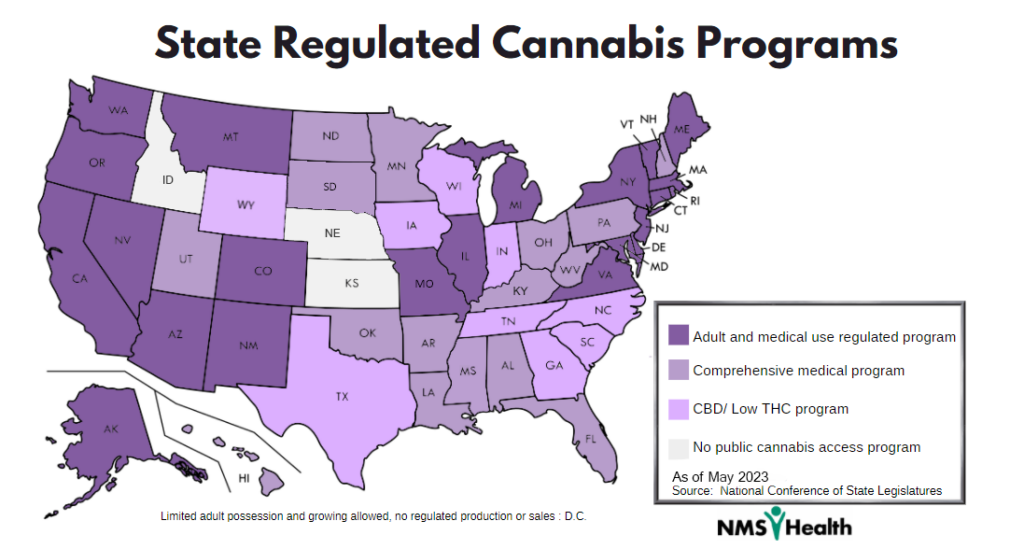As the marijuana landscape continues to evolve, it’s crucial to understand its implications, especially in safety-sensitive industries like trucking. A recent report by the American Transportation Research Institute (ATRI) focused on critical topics related to marijuana legalization in the trucking industry and its consequences, especially for those in who live in jurisdictions where marijuana has been legalized. While marijuana is still prohibited federally, there are now 23% more drivers living in marijuana-legalized jurisdictions than four years ago.
For the report, ATRI analyzed data from the Federal Motor Carrier Safety Administration Drug and Alcohol Clearing house. They also referenced existing research, and surveyed motor carrier and truck drivers on their opinions on the legalization of marijuana. The data collected from these surveys show that drivers and carriers are frustrated with the current testing limitations. In particular they call out the lack of tests for marijuana impairment. The majority (72.4%) of drivers’ and carriers’ comments also support a loosening of cannabis testing and laws. The remaining comments (27.6%) favored maintaining the status quo.
Conflicting regulations
The ATRI’s report builds upon its previous research publication from 2019. It addresses concerns about the rising use of marijuana among truck drivers. This is suggested as primarily attributed to the recreational legalization of the drug. While marijuana remains a Schedule I drug federally, 23 states now have laws in place which legalizes recreational marijuana. In contrast, only 10 states had legalized recreational marijuana in 2019 when the ATRI released its previous study.
The study explores the dilemma faced by carriers due to the conflict between state and federal laws regarding marijuana acceptance. Approximately 39.4% of drivers surveyed operate in states where recreational marijuana use is legal. Carriers’ hiring decisions reflect this regulatory divide as well. Of those surveyed, 43.7% stated they would not hire driver candidates with a previous positive marijuana test result, while 56.3% expressed potential willingness to hire them after specific time periods had lapsed.
The impact of marijuana use
The report highlights the effects of marijuana use on various cognitive functions. They noted that according to the Centers for Disease Control and Prevention that tetrahydrocannabinol (THC), the psychoactive compound in marijuana, affects areas of the brain that control the body’s movements, balance, coordination, memory and judgment. All of which are important components of driving safely.
“The impacts of marijuana also include impaired coordination, distorted perception, memory loss and problem-solving difficulties, as well as decision-making capabilities and reaction times, which can be slowed by marijuana,” the ATRI report said.
Several studies have been conducted regarding marijuana legalization and traffic accidents in recent years. Currently, most of the trends in this area of research suggest that marijuana does impact highway safety outcomes. However, the ATRI report states it may be “too soon to calculate” a definitive relationship between marijuana legalization in the trucking industry and highway safety.
It should also be noted that the effects of marijuana pass relatively quickly. Current safety-sensitive drug testing can detect THC in a user’s system for weeks, even when they are no longer impaired. An unfortunate by-product of the current state of marijuana testing is that it may weed out off-duty marijuana users who were never impaired while driving. Most drivers (55.4%) stated that they believed highway safety had not been impacted by legalized cannabis use. Furthermore, 65% of drivers felt that a cannabis impairment test should replace a cannabis use test. Currently, in the trucking industry, federal regulations prohibit CDL holders from using cannabis. Which is evidenced by the fact that over 55% of positive drug tests in the industry were positive for cannabis metabolite between 2020-2022.
Understanding drivers’ departure
After a driver tests positive, they are temporarily removed from the industry until they complete a series of remedial steps. Startlingly, between 2020 and 2022, more than 100,000 drivers tested positive and were unable to perform their duties. These positive tests have significant implications for an industry already grappling with a national driver shortage, which has fluctuated between 65,000 and 80,000 in recent years.
Additionally, the report delves into the puzzling phenomenon of truck drivers leaving their jobs after failing a marijuana test and not returning to the industry. According to data from the Clearinghouse, marijuana use has a clear impact on the availability of truck drivers. Many of these drivers opt for alternative employment opportunities instead of rejoining the already critically short driver pool. The study found that 72.6% of drivers with positive test results remained in prohibited status at the start of 2023. Only 4.5% completed the rigorous return-to-duty process.
In the report, ATRI speculates that not only are current drivers leaving. Pre-employment drug screening may be dissuading potential drivers from entering the trucking industry. “The federal prohibition of marijuana use by CDL-holders has been highlighted as a potential disincentive for drivers to stay in the industry, and it has even been argued that loosening the restrictions on marijuana use would make the industry more attractive and widen the potential labor pool,” the report notes.
Examining the pathways forward
ATRI’s study presents two potential pathways for the federal government in response to advancing marijuana legalization efforts. The first pathway involves maintaining the current prohibition policy, where marijuana remains classified as a Schedule I drug. In this scenario, marijuana positive tests will continue to result in the removal of thousands of drivers each year.
The second pathway involves easing restrictions and potentially removing marijuana from the Schedule I designation. However, this pathway comes with significant challenges as well. Prior to any federal action, the report identifies protections that must be in place for employers in safety-sensitive industries. These include the development of a nationally recognized marijuana impairment test, impairment standards, and provisions to protect employers’ ability to screen employees for drug use.
“Minnesota recently joined the growing list of states legalizing recreational marijuana. This action underscores the critical need for tools to effectively determine marijuana impairment by current and prospective employees. As an industry committed to workplace and roadway safety, we owe it to ourselves and our families to make sure we can screen to maintain a clean and sober workforce,” Minnesota Trucking Association President John Hausladen told ATRI.
The role of employers
The ever-evolving landscape of marijuana legalization in the trucking industry presents complex challenges for employers. While acceptance and availability of the drug continue to grow, understanding its impact is imperative. Employers must navigate the delicate balance between state and federal laws in order to make informed hiring decisions, and prioritize workplace and roadway safety.
As the industry strives to meet the increasing demand, it is crucial to address the gaps in knowledge surrounding marijuana use and public safety. By staying informed, fostering dialogue, and embracing responsible practices, employers can navigate the shifting landscape and ensure a thriving and secure trucking industry for years to come. To stay up to date on recent marijuana laws and employment protections, please visit our blog, Marijuana Testing: A Guide for Testing Your Employees and Candidates.



